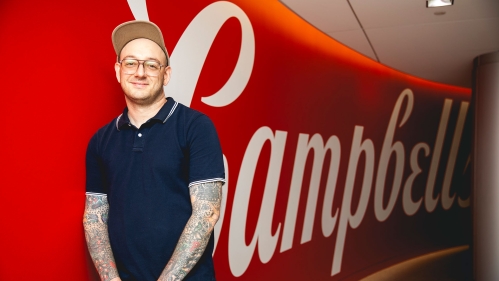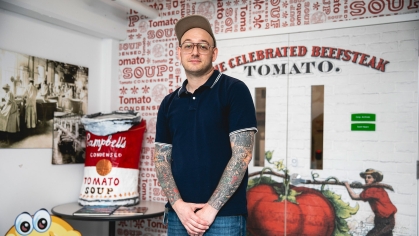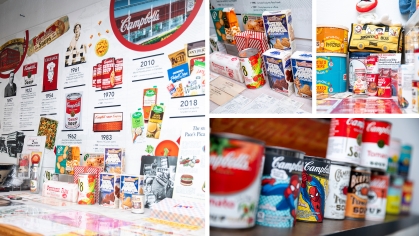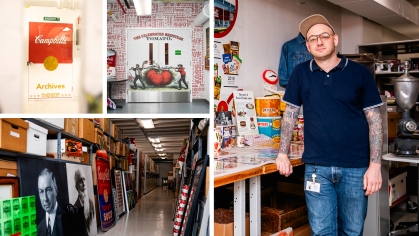Rutgers–Camden Alumnus Preserves Rich History of Campbell’s

Scott Hearn CCAS’15 GSC’17 keeps watch over 150 years of food Americana
On the lower level of the recognizably red Campbell’s corporate headquarters, Rutgers–Camden History alumnus Scott Hearn’s office is not a cubicle so much as a vintage treasure trove. As the company’s corporate archivist, Hearn stewards a collection of more than 10,000 artifacts. In addition to the signature soups of Campbell’s, the collection includes items from brands like Pepperidge Farm, Prego, Swanson, and other pantry staples that line millions of shelves across America and beyond.

People always asked me what I could do with a history degree. There's a world of stuff you can do with a history degree. You don't have to be a professor. You could be a corporate archivist. You could fall into a role that you never even knew existed.
Scott Hearn
Campbell's Corporate Archivist
Originally from Burlington County, Hearn began his undergraduate journey directly out of high school but soon felt not quite ready for college life; he took a break and took to the road. After a few years and many more miles on his odometer, he went back to community college and was later accepted at Rutgers University–Camden, where his academic and professional aspirations quickly started to fall into place.
“History was one of the only things I ever found engaging in school,” Hearn said. “Rutgers has a great name, but the key was that they had a good history department. It was close to home, and I knew I could get a good education there.”
Rutgers–Camden’s dual-degree program also appealed to Hearn, who was eager to complete his undergraduate and graduate degrees successively. “Being an older student, I knew that if I didn’t start my master’s right away, I was never going to do it,” he said. “So I started taking graduate courses while finishing my bachelor's degree.”
One of Hearn’s classes was taught by Professor of History Charlene Mires, then-director of the Mid-Atlantic Regional Center for the Humanities (MARCH), an interdisciplinary historical research hub at Rutgers–Camden. Mires connected her student with the Encyclopedia of Greater Philadelphia, a civic project through MARCH with the goal to amass the most comprehensive digital-first reference guide for the greater Philadelphia region.
Under Mires’s direction, Hearn managed the Encyclopedia’s social media presence and began to connect news events with the collection’s historical essays. The knowledge he gained through the project, along with an archival role with the City of Philadelphia, led Hearn to a role telling the stories of the Camden-based Campbell’s, where he has served for more than six years.
Hearn is the company’s preservationist and as well as its anecdotalist on the details behind the artifacts. Within Campbell’s, Hearn shares company lore in talks to new staff, visitors, employees, and guests at events like Family Days. He curates colorful building displays filled with vintage brand packaging and art from the organization’s vast collection, which spans corporate records, advertising, cookbooks, and licensed products.
Hearn continuously seeks to add to the records, keep Campbell’s history safe, and collect new items to build out the collection.

We have a lot of great stuff, but there are items missing. My job is to fill in those gaps and create a fuller history that is not just business- or brand-based, but also employee-based, because those are interesting stories that we don’t want to be left out.
Scott Hearn
One such story was that of retired employee Daisy Lee Riley, a Camden native who, in 1943, became one of the first Black women to work for the company. Hearn and his colleagues invited Riley back to Campbell’s for her 100th birthday celebration last fall, shortly before her death in December.
Hearn also shared that the iconic Campbell’s green bean casserole has South Jersey roots, as it was developed in 1955 by an employee named Dorcas Reilly. On the internet alone, the company’s recipe is viewed an estimated four million times each Thanksgiving season.
The sheer scale of managing the organization’s historical product repository can be daunting for Hearn, who has found professional camaraderie online with fellow corporate archivists from companies such as McDonald’s and Pokémon USA. That challenge is eased by the satisfaction he finds in responding to a historical query, answering a consumer question, or locating a long-lost recipe based on just two ingredients.

Hearn is also proud to represent his company’s longstanding ties to the area. “What I appreciate the most is that the business is 155 years old, founded in 1869 in Camden, New Jersey. And where are we right now? We're still in Camden, New Jersey,” he said. “It's wild to think that a company founded in Camden in 1869 is still going strong and growing consistently.”
It isn’t lost on Hearn that less than a mile away, his education at Rutgers–Camden now helps him oversee the vast archives of one of the nation’s most storied food brands.
“Studying history is a skill; you have to be trained,” Hearn said. “If you study history, you'll learn that it’s much more expansive and much grayer than you do in high school. It’s great to know the date something happened, but what caused it? That's the key. And Rutgers–Camden has one of the best history programs around for this. Students come out well prepared for whatever they want to do.”


